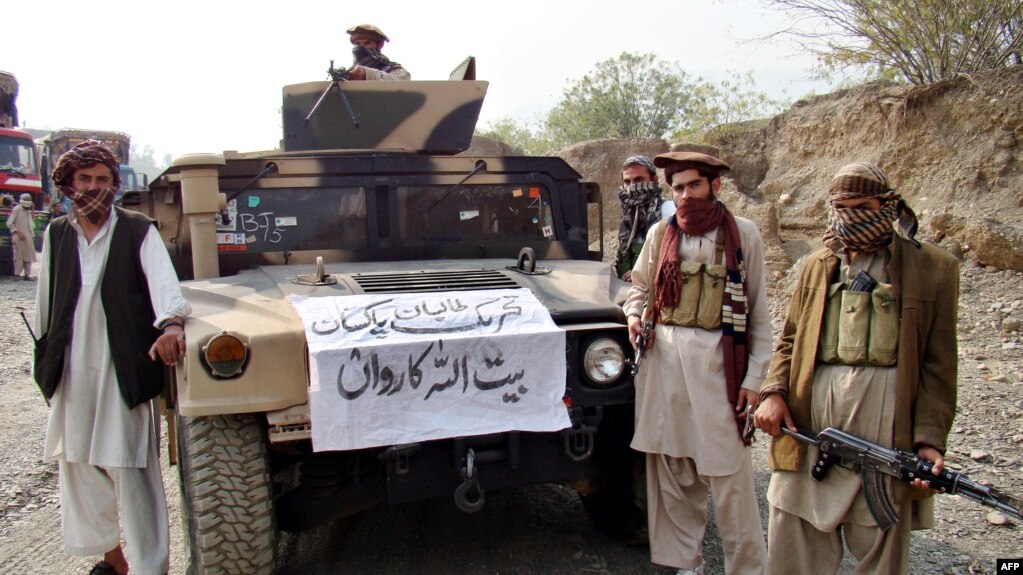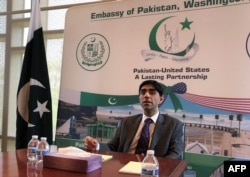FILE - Armed militants of Tehrik-i-Taliban Pakistan (TTP) pose for photographs next to a captured armored vehicle in the Pakistan-Afghanistan border town of Landikotal, November 10, 2008.
Pakistan is engaging in peace talks with the outlawed militant alliance known as the Tehrik-i-Taliban Pakistan (TTP) in an effort to steer them away from years of anti-state violence, according to unnamed officials who are playing down the significance of negotiations in its early stages.
Multiple officials in Islamabad confirmed Friday the dialogue is ongoing in Afghanistan, and that the neighboring country's new Taliban rulers are aiding the process.
"It is ongoing. Nothing concrete as of now," one of the sources, who asked that his name be withheld to speak candidly, told VOA.
Another source said the process is aimed at bringing TTP "foot soldiers who are not involved in serious crimes against the state" back into Pakistan's constitutional and legal framework. A proposed amnesty for the militants also is under consideration in line with the country's constitution, they added.
FILE - Moeed Yusuf, Pakistan's national
security advisor, speaks to reporters
at the Pakistani embassy in Washington
on Aug. 4, 2021, after a week of meetings
with U.S. officials.
Pakistan's national security adviser, Moeed Yusuf, defended the negotiations Thursday while speaking to a virtual event at the Washington-based Middle East Institute. He said the Pakistani government previously had also undertaken such initiatives.
"All states should talk, and if there are ways to bring your own citizens back into the fold of normal legal structures and bounds and constitution, we should," Yusuf said.
But the adviser played down the media hype around the peace talks with TTP.
"I think it has been taken out of proportion. There isn't any mega-negotiation project as such," Yusuf said.
"There has been a change in Afghanistan, and we want to see whether better sense will prevail," the Pakistani adviser continued, adding that he hopes the TTP "will realize that there is a constitution of Pakistan, [that] there is a legal structure within which, if they want to operate, they will actually be better off."
Confidence-building measures
The English-language Dawn newspaper reported Friday that "a tentative understanding" had been reached between the two sides, requiring TTP to declare a countrywide truce in return for the release of an unknown number of their prisoners from Pakistani jails "as part of confidence-building measures."
The monthlong truce would come into effect once the prisoners are released, possibly paving the ground for a "broader peace agreement" to end nearly two decades of militant violence in Pakistan, the paper quoted its sources as saying.
Last month, Pakistani Prime Minister Imran Khan revealed for the first time in a television interview his government had been engaged in talks with "some groups" within TTP, saying Afghanistan was hosting the process and Taliban rulers there were acting as mediators.
The Pakistani militant alliance responded by denying Khan's assertion that the two sides were in negotiations; neither the Afghan Taliban nor TTP militants have since commented on the negotiations.
Years of violence, failed negotiations
Tens of thousands of Pakistanis, including security forces, have died in terrorist attacks claimed by the Pakistani Taliban since the group emerged in 2007.
Failed talks with the TTP prompted Pakistan to launch counter-militancy offensives against the group's strongholds near the Afghan border in 2014, killing several thousand militants and forcing others to flee across the border into Afghanistan.
While security measures reduced militant violence in Pakistan for several years, the country has witnessed a resurgence of TTP attacks since the start of 2021, which have killed and injured hundreds of security forces.
Islamabad had strained diplomatic ties with the Western-backed former Afghan government that collapsed in the face of the stunning Taliban victories that enabled the Islamist movement to seize control of Kabul in August.
Pakistan consistently accused the previous Afghan rulers of sheltering fugitive TTP leaders and helping them to orchestrate cross-border terrorist attacks against Pakistan. Pakistan's alleged support for the Afghan Taliban is believed to have played a role in helping the insurgent group wage and sustain attacks against the former Kabul government forces, as well as U.S.-led foreign troops in Afghanistan over the past 20 years — charges Islamabad denies.
Sirajuddin Haqqani, the interior minister of the Taliban's interim government in Afghanistan, is said to be acting as a mediator in Pakistan's peace talks with TTP. He heads the notorious Haqqani network of militants designated as a global terrorist by the U.S. He himself is wanted by the U.S. and carries a bounty of $10 million for information leading to his arrest.
The Afghan Taliban interior minister allegedly maintains ties with the Pakistani spy agency and the TTP, which is designated as a global terrorist group by Washington and the United Nations.
Critics say Pakistan's long-running support for the Taliban has prompted Islamabad to seek payback by pressing the acting Kabul government to help in containing TTP-led violence.
Afghanistan's Taliban are said to be hosting peace negotiations between Islamabad, Pakistani Taliban

www.voanews.com











